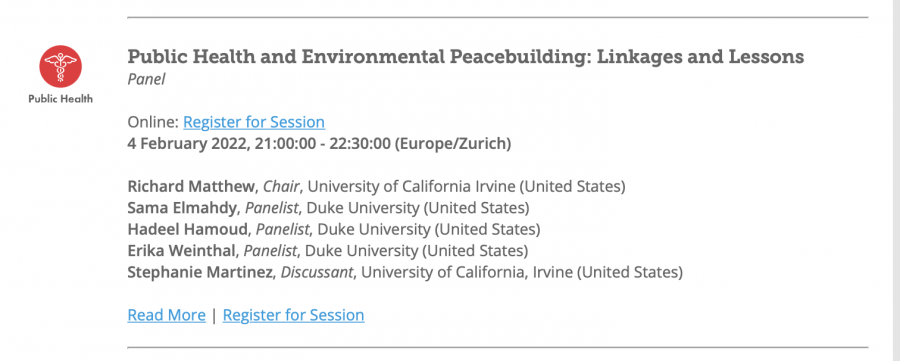Examining Access to Water, Sanitation and Hygiene in Egypt and Sudan
June 30, 2022
In Spring 2021, Sama Elmahdy ’22 (Global Health and Psychology) and Hadeel Hamoud ’22 (International Comparative Studies and Political Science) received a Bass Connections Student Research Award to examine access to water, sanitation and hygiene (WASH) in Egypt and Sudan amidst the COVID-19 pandemic. Building on the work of the Mapping WASH and COVID-19 in the Middle East and North Africa team, Elmahdy and Hamoud conducted interviews with leading experts in the field, including WASH specialists from the World Bank and the United Nations, and identified major impacts of COVID-19 on provision and capacity of humanitarian services across various populations in the region. The pair went on to present their findings at the 2nd International Conference on Environmental Peacebuilding. Erika Weinthal served as their faculty advisor.

By Sama Elmahdy and Hadeel Hamoud
Water, sanitation and hygiene (WASH) are intimately connected to human health and security. The COVID-19 pandemic, in particular, has illuminated these linkages in mainstream public discourse. In this project, we analyzed access to WASH in Egypt and Sudan, two of Africa’s largest and most populous countries.
In Egypt, about 8.4 million people, mostly in rural areas, lack access to improved sanitation. As of 2015, only 6% of Egyptian villages were being provided with wastewater treatment services. Nevertheless, as of 2014, 92.4% of households had direct access to safe drinking water.
In Sudan, rates of access to drinking water vary from 95% of people in Khartoum to 30% in North Darfur, and 11% of child deaths are attributed to poor WASH access.
Protracted conflicts in the MENA region have led to the collapse and decreased capacity of WASH systems and services, so humanitarian actors have played an increasingly crucial role in filling gaps in supply and service provision.
During the summer of 2021, we investigated the challenges and opportunities for capacity building among international and local humanitarian organizations as they worked to expand access to WASH in the face of COVID-19 in Egypt and Sudan. Our research sought to 1) examine how COVID-19 has affected existing efforts by humanitarian actors to expand the capacities of the WASH sector; 2) illuminate how the pandemic has fostered new interventions; and 3) identify possibilities for building resilience, especially among humanitarian actors serving refugee populations.
We took a qualitative approach, interviewing several authors, researchers and actors in the WASH sector to understand the existing interventions in Egypt and Sudan, the impact of COVID-19 on these interventions, organizations’ responses to the crisis and the possibility of new interventions consequent to the pandemic.
In order to gain some background information, we interviewed one of the authors of a paper that studied WASH interventions in several Middle Eastern countries. We gained valuable insight into the framing of our own project through this interview and learned important tips to keep in mind while interviewing our participants. We then interviewed the WASH sector coordinator, United Nations Children’s Fund representative, and head of the United Nations High Commission for Refugees WASH program in Sudan as well as the World Bank water division lead in Egypt.
Our research identified several themes around responses to COVID-19 within the WASH humanitarian sector, including adaptation to increased funding and upscaling WASH response; an integration of existing protocols for other WASH-related illnesses like cholera; innovations to continue providing WASH access while limiting COVID-19’s spread; and adaptations to cultural factors shaping concepts of sanitation and hygiene. We also identified several challenges to the resilience of WASH humanitarian actors, including poor emergency stockpiles, decreased internal capacities due to fear and a lack of knowledge about COVID and misinformation or poor information networks.

The Bass Connections Student Research Award supported data collection, transcription and qualitative coding analysis and the materials needed to present at the 2nd International Conference on Environmental Peacebuilding. We are incredibly grateful for the opportunities afforded to us by Bass Connections. In addition to financial support, this program connected us to our research mentor, Erika Weinthal, who was integral to our project.
Our project enabled us to meet leading figures working at the forefront of WASH efforts in Egypt and Sudan and to gain a more intimate and comprehensive understanding of the work of international NGOs. Overall, this project has inspired us to pursue further research and work within the WASH sector.
Learn More
- Find out more about the 2020-2021 Mapping WASH and COVID-19 in the Middle East and North Africa project team.
- Explore the work of other teams that addressed challenges related to COVID-19.
- Meet all the recipients of the 2021 Bass Connections Student Research Award, and see who won the award this year.
